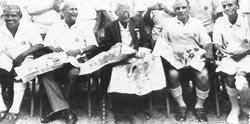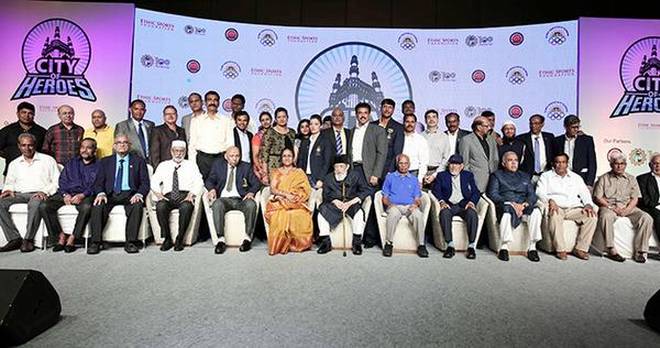Hyderabad, TELANGANA :

NOOR MOHAMMED who passed away in Hyderabad recently belonged to the golden era of Indian football. Those were the days when the Indian teams had a place of their own even at the international level. And when it came to talent, Hyderabad was among the top producers of this precious commodity.
In fact the widespread popularity of football in Hyderabad (the game was introduced here by British armymen) began as early as 1915 when the All India Majeed tournament was revived with great success. Over the next fifteen years the sport flourished in Hyderabad and players such as Riasath, Abdul Majeed Kazimi, Jawad, Qutub Ali, S. M. Hadi, Papaiah, Sharifuddin, Agha Mahmood and Quddus became household names.
The colourful personalities of some players attracted the attention of sports lovers. S. M. Hadi was a genuine sportsman and excelled in cricket, hockey and tennis besides football. He later became the founder secretary of the Hyderabad Football Association. Kazimi who was a teacher by profession was one of the best centre half’s that Hyderabad produced while Qader Khan whose parents hoped that he would become a religious teacher had other ideas and took up football to become a top class goalkeeper by the time he was sixteen. His services were so much in demand that the Nawab of Tadbund had him kept under close watch (sometimes even under physical restrictions) to prevent him from defecting to other teams.
Later the football traditions were continued by other well known players such as S. K. Moinuddin, N. A. Fruvall, S. K. Azizuddin, Shaik Jamal, G. Eeriah, Ghulam Laiq, Noor Mohammed, Anthony Patrick, Yousuf Khan, Susai and Doraiswamy to name a few. Such was their skill and dexterity that players from Hyderabad were in great demand throughout the country and the clubs from Calcutta and Bombay were keen to grab the available talent. The contribution of City College Old Boys Club (CCOB) towards development of Hyderabad football was also considerable and many a great player made his beginning from CCOB.
Fruvall was one of the leading figures in the Hyderabad City Police team first as a player (he was rated to be one of the finest right backs in the country) then as a successful coach helping the police team to win thirteen All India titles including Rovers and Durand. Jamal along with his brother Noor Mohammed and Anthony Patrick were a formidable trio in midfield. Patrick was an outstanding right half and represented India in the Asian Games.
Among the frontliners Moinuddin popularly known as Moin was one of the best forwards seen on the football fields in Hyderabad. His speed and sharpshooting made him one of the most dangerous players in the Police team. He also represented India on numerous occasions including Helsinki Olympics and Manila Asian Games. Another dangerous forward was Doraiswamy, a tall and strong player who often caught rivals napping with a sudden burst of speed.Among defenders none could come up to the standards of Azizuddin a strongly built man with a powerful kick from either foot and a difficult man to get past. Besides leading Hyderabad to National title triumphs in 1956 and 1957, Aziz represented India from 1949 to 1958 and led the National squad in a quadrangular tournament in Dacca in 1955.
S. A. Lateef was one of the notable products of the CCOB Club and he made a name for himself playing in Bombay and for India. Other notable Hyderabad players who represented the country in the Olympics at various stages include S. A. Salaam, Yusuf Khan, Md. Zulfiqar, T. Balaram, Ahmed Husain, S. S. Hakeem, Peter Thangaraj and D. Kannan. These players from Hyderabad played with distinction for their country and were a source of inspiration for those who followed such as S. Kaleemuddin, Habeeb, Akbar, Shabbir Ali, Victor Amalraj, Fareed and others like Naimuddin, Rahamatullah and Samad.
However despite having produced several notable international level players, Hyderabad’s greatest contribution to Indian football was probably S. A. Rahim rated by experts of those days to be as knowledgeable and effective as any European coach. For several years he was the country’s chief coach and it was under his guidance that India chalked up that memorable fourth place at the Melbourne Olympics. Rahim during his travels in Eupore watched the coaches there, picked up points and implemented them after adapting them to Indian players and conditions. He was adept at his job and left a lasting impression on Indian football.
Many of these great players of Hyderabad came from humble backgrounds but had one thing in common – their love for the game and their burning ambition to excel at it. Noor was a typical example. Son of a bangle shop owner, Noor had himself confessed that he was not very good at studies and academic prowess never interested him. Instead he was drawn to several sports at a young age. A frequent visitor to the Victory Playground (which is still a cradle for sport in the city) Noor used to watch volleyball, basketball and football matches with avid interest. The skills that sportsmen posseseed and their display of strength and stamina impressed him and he quickly became drawn to sports particularly football.
Experts never rated Noor as a gifted player but his determination and hard work made him a fine performer. Moreover he never had a very robust physique. Old photographs of Noor Mohammed during his prime show a slim young man of average height with straight jet black hair and a bony face. Not the kind of appearance one would associate with a sports superstar. But then as they say appearances can be deceptive. Noor made up for everything with his uncanny knack of being at the right spot at the right time and a superb football brain.
While his father was busy at the bangle shop, Noor was busy playing football. He gave up studies at an early age much to the disapproval of his elder brother Sheik Jamal who was himself a state player. Later Jamal was to recognise the immense potential that Noor had and encouraged the latter to achieve greater heights.
Noor’s abilities saw him rise rapidly in the sport and he went on to represent the Hyderabad City Police team which was then a formidable outfit. Noor became one of the key players in the side and it went on to many victories in national tournaments including a five-in-a-row triumph in the Rovers Cup in the early fifties.Noor married at an early age and sceptics felt that family responsibilities may affect his game. But Noor was made of sterner stuff. He continued to work on his game and even rose to greater heights as the years passed. Noor represented India in the Helsinki Olympics in 1952 and also the Melbourne Olympics in 1956.
Before the Melbourne Olympics Noor was not too confident of being selected in the team. By then he was 35 years old and the talk prevailing in football circles then was that there should be young blood in the team and players in their twenties should be given preference.
But Noor’s consistent performances could not be ignored and he found himself in the team which went on to record one of the best ever performances by an Indian team in the Olympic Games when it came fourth.
Noor recalled later that the team was determined to put up a better show than the one at Helsinki and its dedication and hard work paid off. Noor’s other accomplishments included playing for the country in three Asian Games including New Delhi, Manila and Tokyo besides playing in the squad on its foreign tours to Phillipines in 1954 and Russia in 1954- 55.
But even great players have to quit the field sooner or later and in Noor’s case it was a little sooner than expected when during a match against Mohammedan Club of Pakistan he was brutally tackled and felled and his leg badly injured. He was never the same player again. Noor said later that the injury virtually crippled him otherwise he may have continued to play for another couple of years.
Noor went on to become a selector for AIFF and then took up coaching children. He always felt that young children held the key to the future development of the sport. The only way to promote football and raise standards was to enthuse the children and inculcate in them a burning desire to excel. If the players did not have hunger for success then they could never improve he always used to say. Perhaps he remembered his young days of watching players and gaining inspiration.
Unfortunately this fine player and gentleman fell on bad days after his playing career was over. Nowadays in the era of multi- millionaire sportsmen it seems grossly unfair that a player who did so much for the country should have to live in the way he did in his last years. But it remains a fact that Noor (as indeed is the fate of many other former sportspersons of this country) was soon in dire straits financially. Noor’s pride and principles prevented him from asking for favours from the establishment and there was none to fight his case.
After retiring from the police service, he spent his days in a small house in a nondescript lane in Osmanpura. Not many even knew that he was a double Olympian and that his feats had helped to maintain national pride and prestige on football fields throughout the world.
To make things worse he developed tuberculosis but despite his frail health he always made it a point to be present at the Lal Bahadur stadium in Hyderabad whenever a major tournament was in progress there. Always a simple and modest man Noor was always happy to have visitors especially from the media at his house for then his favourite topic football could be discussed.
But a couple of months ago, it was clear that his fragile health was deteriorating. When the end came a pall of gloom descended on football circles in Hyderabad. Condolence messages flowed in from far and near. A host of football luminaries including officials, coaches, players of the past and present all attended the funeral to bid goodbye to this great player and fine gentleman.
Another famous name in Hyderabad football – Yousuf Khan – ex Olympian and Arjuna awardee, made a relevant observation in his tribute when he said that Noor was an inspiration for him (Yousuf) and generations of players who followed.
“Noor’s tactical brilliance, flawless technique and steely determination were an inspiration to all of us. We learnt a lot from watching him,” said Yousuf Khan who is himself unfortunately not in sound health.
source: http://www.thehindu.com / The Hindu / Home> Sport / Online Edition / by Abhijit Sen Gupta, Hyderabad / Saturday – June 17th, 2000










